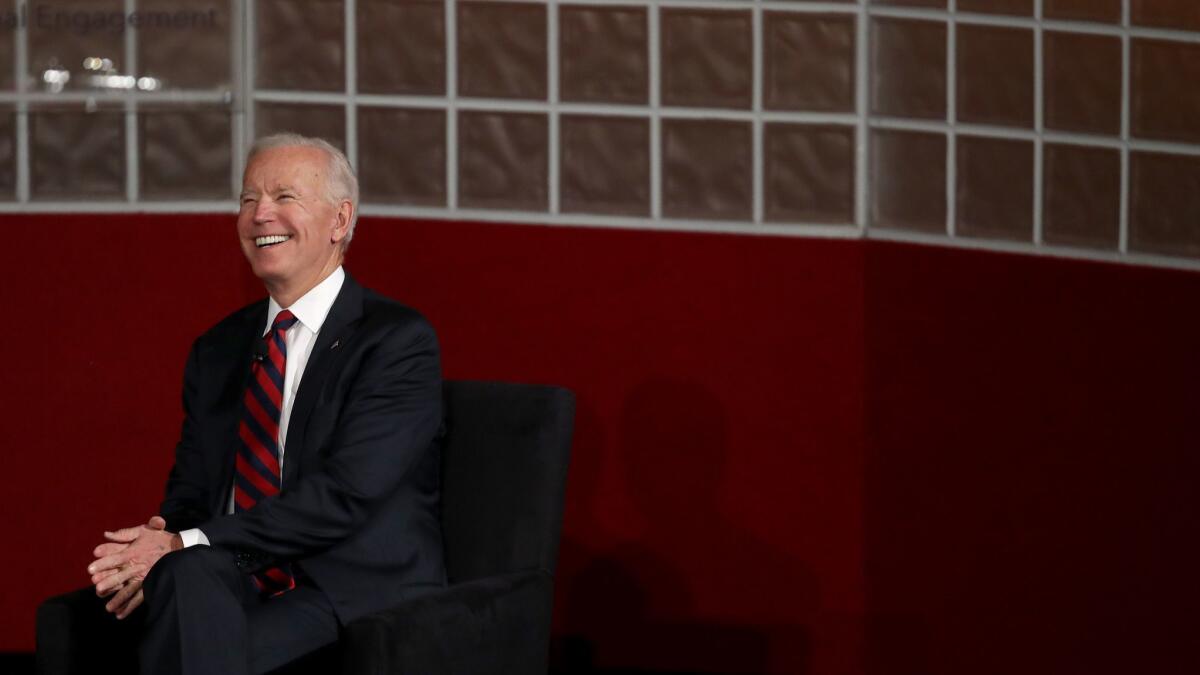Op-Ed: Why Joe Biden would probably win the Democratic primary

- Share via
The field of Democratic presidential candidates may seem overstuffed, but the party appears to be waiting for one more candidate to announce: former Vice President Joe Biden.
It’s clear that Biden is considered a formidable prospect. In addition to his lead in early polls, there has been a smattering of negative stories about his voting record in the Senate — an indication that the horse-race analysis has begun in earnest.
But there is another reason to believe that Biden is a leading position: Recent history has shown that vice presidents have a strong advantage in presidential primaries.
Should Biden choose to run, his association with a popular former president could prove a decisive factor.
This wasn’t always the case. Between 1841 and 1901, four vice presidents succeeded to the presidency because presidents died in office. After serving their partial first terms, not one of those four went on to win their party’s nomination for president.
John Nance Garner, who served as vice president from 1933 to 1941, reportedly commented that the job wasn’t worth “a bucket of warm spit.”
Theodore Roosevelt broke the pattern, to some extent, when he unexpectedly became the country’s 26th president after the assassination of President William McKinley. Roosevelt was then elected to a full term.
But it was not until 1960 that a vice president (Richard Nixon) managed to win his party’s nomination and ascend to the Oval Office without taking over for a president who died.
If we count Harry Truman, who became president unexpectedly when Franklin D. Roosevelt died and was later elected to a full term, seven out of 12 recent vice presidents have sought and won their party’s nomination for the presidency: Truman and Nixon, plus Lyndon Johnson, Gerald Ford, Walter Mondale, George H.W. Bush and Al Gore.
This shift in stature of the vice presidency is attributable, in part, to changes in the political system. Before World War II, vice presidents were chosen by the political party as a kind of bargaining chip — a way to join the party’s divided wings.
The rise of the primary process changed this dynamic. Vice presidents are now selected by the presidential nominee. Often, the presidential candidate is looking for someone with sufficient name recognition to help him get over the top. As a result, vice presidential picks tend to be more well-known than in previous decades.
In the 19th century, for instance, vice presidents included a New Jersey state senator and a former collector of the New York Ports. But since 1944, every first-choice Democratic vice presidential nominee but one was a sitting U.S. senator, and the exception was a congresswoman.
Of our 12 most recent vice presidents, only five did not seek the presidential nomination. They include Spiro Agnew, who resigned in disgrace; Nelson Rockefeller, who died; Dan Quayle, who was viewed as somewhat of a laughingstock; and Dick Cheney, who wasn’t considered to be in good enough health.
The fifth vice president to not go on to seek the presidential nomination is Biden, who declined to run against Hillary Clinton in 2016. He may not shy away from the primary this time around.
If Biden enters the race, his chances of winning the nomination are strong. Most modern presidents retain popularity after they leave office, especially within their own party, and the vice president is often able to translate this popularity into a successful run.
Enter the Fray: First takes on the news of the minute »
Certainly this is the case with Barack Obama, who topped a recent Pew Research Center survey of “best presidents.” Should Biden choose to run, his association with a popular former president could prove a decisive factor.
There is one significant hurdle Biden could face: He has already run in presidential primaries.
Democratic candidates who’ve run in a past presidential primary tend not to win the nomination in subsequent presidential primaries, and Biden has run twice — in 1988, and again in 2008. (Bernie Sanders could face the same hurdle.)
But this would likely be outweighed by his two terms as vice president under Obama, who, according to the Pew survey, a plurality of Americans say is the best president of their lifetime.
Joshua Spivak is a senior fellow at the Hugh L. Carey Institute for Government Reform at Wagner College. He writes for “The Recall Elections Blog.”
Follow the Opinion section on Twitter @latimesopinion or Facebook
More to Read
A cure for the common opinion
Get thought-provoking perspectives with our weekly newsletter.
You may occasionally receive promotional content from the Los Angeles Times.










